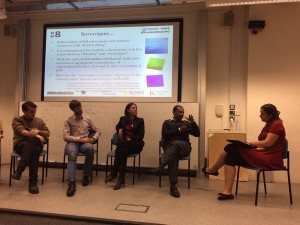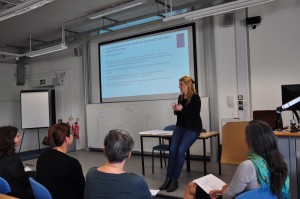Rebecca Peters is a 2014 Marshall Scholar currently a Water Science and Governance MSc candidate with King’s Water. She recently completed an MSc in Poverty and Economic Development at the University of Manchester focused on land use change, water governance, and irrigated agriculture in South Africa. Her previous research in Bolivia and Mexico as a Berkeley Law Human Rights Fellow and Blum Center for Developing Economies Fellow included peri-urban water access and rural sanitation issues. Here, Rebecca reflects on her experience at HH8 facilitating a human rights negotiation simulation.
Background
The inspiration for this session was came from a Harvard Law negotiation simulation for a transboundary water dispute that I attended in Fall 2012. As a current Water Science and Governance MSc candidate at KCL, I wanted to bring the experience of that simulation with deeper concepts of transboundary water justice. The simulation for the Human Rights and Water: Legal Mechanisms Protecting Water Access consequently focused on a Thai financed dam built on the Mekong River in Laos. The session, a simulated negotiation, developed to include non-state actors such as journalists, rural farmers who would be displaced by the dam, and the intergovernmental Mekong River Commission. This dynamic session encouraged critical thought from participants regarding the possibilities and limitations of human rights in advocating for access to water in a transboundary system.
There were four learning goals for participants of this simulation of a negotiated agreement for dam building along the Mekong River. First, we considered the types of human rights at stake when discussing hegemony, power, and transboundary waters – not just “right to water” but development, free speech, press, demonstration, clean environment, food security, and livelihoods. I directed the session to critically examine multiple forms of exercises of power beyond ‘the state’. Accordingly, the simulation emphasized that multiple kinds of knowledge from basin stakeholders must be incorporated to reach meaningful, lasting agreements to benefit as many people as possible. Lastly, ‘experts’ and powerful actors need to interact with all users throughout the negotiation process.
Session framing: power, water, and dams
The session began by introducing human rights and water. We discussed a water diplomacy framework which examines three different aspects of water decision making in conflict resolution including domains and scales; water availability; and water systems. Participants then reviewed key components of negotiation including different strategies (problem solving, facilitation, yielding), various tactics (compensation, aggression, compromising), and outcomes ranging from cooperative to conflictive.
Building on this, we discussed the hegemonic processes involved in dams along transboundary waters including the multiple purposes they serve such as irrigation, power generation, water diversion, and flow stablilization. A critical examination of the adverse consequences of dams including negative effects on water quality, sedimentation, harming aquatic biota, habitat destruction, and livelihood displacement raised heated debate. Our close look at expressions of state power via tactics of coercion, force, and securitization to ensure resource exploitation and consolidating control surprised participants who were unaware of the contentions behind the construction of large dams. In particular, bias in impact assessments including the exclusion of socioeconomic impacts became an important theme later in our simulation.
Actors in the session
The complex case selected for the simulation focused on the Xayaburi Dam, a Thai and donor financed hydroelectric dam in Laos. Attendees of this sessions, diverse in their backgrounds and experience, were encouraged to select a position not aligned with their own viewpoints. Participants transformed from lawyers and scientists into a Thai bank and a construction company; a Cambodian representative at the Mekong River Commission; two Laotian farmers and fisher people; International Rivers, an activist group; a judge with the International Human Rights Court; and two journalists, one from the BBC and another with the local Laotian newspaper. The roles for each actor were outlined, with particular bargaining points and interests shared.
Simulation
The simulation then began by overviewing the negotiation process, starting with strategies for Best Alternative to a Negotiated Settlement (BATNA). Each actor took a few minutes to think up their BATNAs to increase their negotiation power and position. Once these were established, guiding questions for actors to consider as they build coalitions were presented. These questions focused on water availability, decision making processes, enforcement of outcomes, and plans for future development. Participants were then given an hour and a half for coalition building (and breaking), negotiating, deal making, and reputation smearing before we came together to reflect on outcomes.
Reflections: Justice, advocacy, and representation
Our closing reflection focused on the role of human rights law and concepts during our simulation. No agreement was reached regarding the dam construction. Most participants suggested that “rights” were used as a tool to achieve certain ends, rather than being a key part of a legal or advocacy strategy.
We discussed limitations to human rights framing in relation to water. In particular, water rights language in reference to Palestine has been explicitly invoked since the Oslo Accords, with little consequence in ameliorating the problem. In response to the inability (so far) of international legal frameworks to lead to equitable acces s to water, other strategies besides “rights” have come to include boycotts, divestment, and sanctions aimed at generating a global awareness regarding restrictions on Palestinian water and sanitation. Other tools, such as cross‐cultural dialogue, internal cultural discourse, and relations among rights, the state, and religion could be undertaken simultaneously with these strategies. A core part of this strategic reframing of water access is as an issue of internal legitimacy and function of water access mechanisms rather than abstract “universal” human rights. Such internal legitimacy was understood to be more important to ultimately achieve more ‘just’ outcomes in practice.
s to water, other strategies besides “rights” have come to include boycotts, divestment, and sanctions aimed at generating a global awareness regarding restrictions on Palestinian water and sanitation. Other tools, such as cross‐cultural dialogue, internal cultural discourse, and relations among rights, the state, and religion could be undertaken simultaneously with these strategies. A core part of this strategic reframing of water access is as an issue of internal legitimacy and function of water access mechanisms rather than abstract “universal” human rights. Such internal legitimacy was understood to be more important to ultimately achieve more ‘just’ outcomes in practice.
One of the benefits of a human rights approach to water that our session discussed was forcing public responses to reports documenting ‘rights’ violations. However, participants also noted that human rights claims may masquerade as comprehensive and objective accounts but are actually selective in their framing of issues. Participants critiqued the consequences of decontextualizing events as depoliticizing human rights issues by drawing attention away from structural processes of power, and reducing to technical problems concerning the functioning of a legal system. Furthermore, contrary to the “internal validation” idea is an approach to advocacy for access to water that interrogates historical processes and institutional arrangements that have fabricated the dialects of universal rights. Such an approach would not “depend on flawed oppositions between the universal and the particular… or universalism versus cultural relativism” but rather invokes a “thick ethics” of morality as a basis for claims of access to water (cf. Abu Lughold). We considered the idea of transboundary water justice as a particular conceptualization of an alternative ethical register to understand access to water, aside from human rights.
Conclusions: plenary wrap up
A number of the tensions and themes explored in our Human Rights session were raised in the closing plenary. In particular, the character of water issues against a backdrop of decentralized distribution mechanisms, imperative for community participation, the spectre of transnational corporate influence, and flow of international donor aid provides a complex context in which to imagine a future of an effective human rights legal framework. Whether or not “the masters tools may dismantle the masters house” – if international laws connecting human rights to water access may contribute to making a more just world – remains unclear. However, participants in the HH8 may all benefit from knowing that there are other visionary scholars, activists, scientists, and legal practitioners who are committed to contributing to water justice across local and global scales.
For more about HH8, see this post and the Workshop webpage. Read more about Rebecca’s time with King’s Water here.
